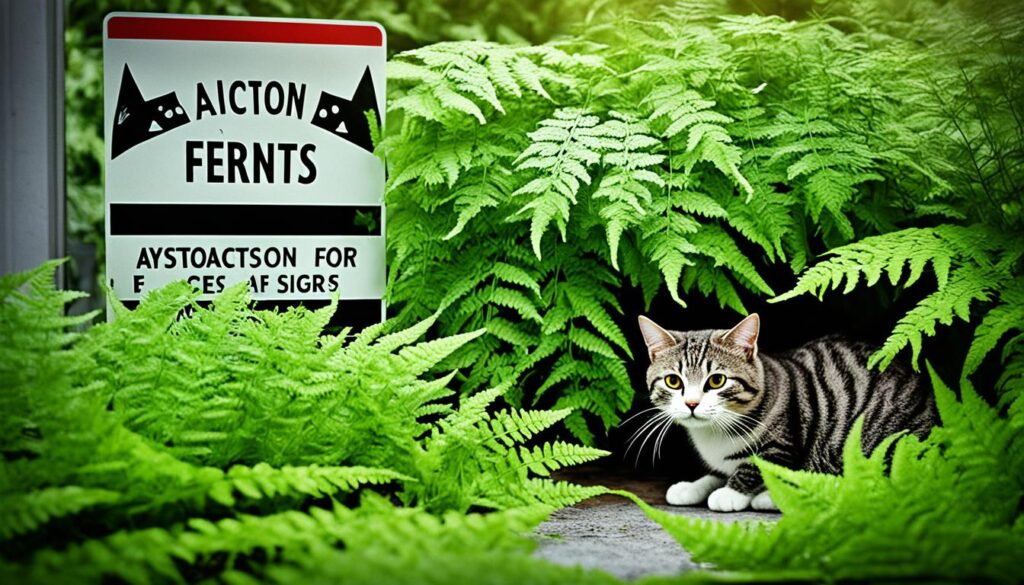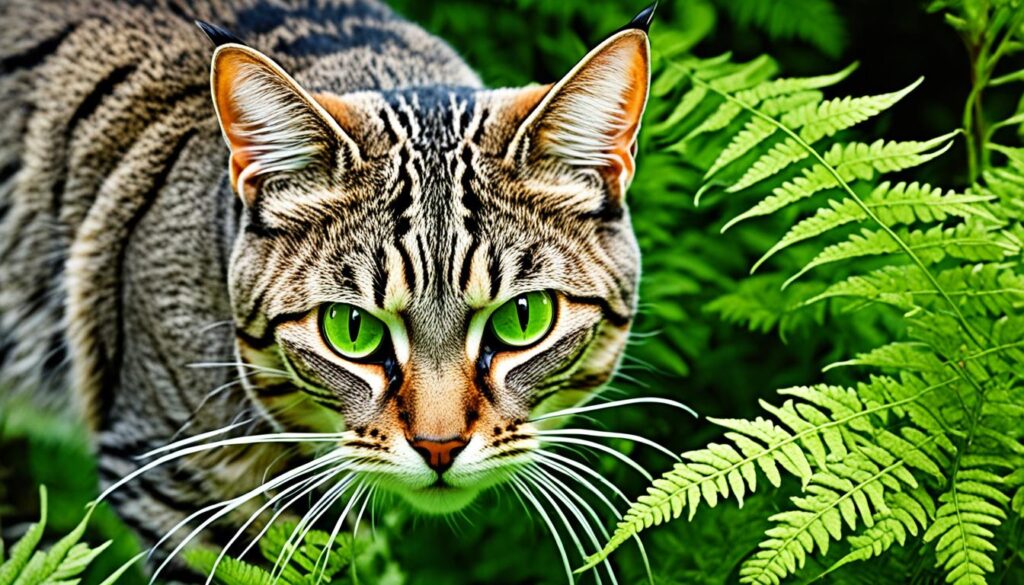Safe or Toxic? Are Ferns Poisonous to Cats
Cats are curious creatures, and as pet parents, we want to ensure their safety around the plants in our homes. When it comes to ferns and cats, it’s important to know which ferns are safe and which ones can be toxic. While most ferns are not poisonous to cats, there are some faux ferns that can pose a risk. In this guide, we’ll explore the different types of ferns and provide information on what to do if your cat ingests a fern.
Key Takeaways:
- Most ferns are not poisonous to cats, but there are some toxic fern-like plants to be aware of.
- True ferns such as Boston fern and rabbit’s foot fern are generally safe for cats, but it’s still best to discourage them from eating them.
- Faux ferns and fern-like plants like asparagus fern and Sprengeri fern can be toxic to cats and should be kept out of their reach.
- If you suspect your cat has ingested a toxic plant, consult with your veterinarian for guidance and possible treatment.
- By being informed and taking precautions, you can provide a cat-safe environment in your home.
Are Ferns Poisonous to Cats?
In general, most ferns are not poisonous to cats. However, it’s important to be aware that there are some fern-like plants and plants with “fern” in their name that can be toxic to cats. These faux ferns may be easily confused with true ferns, posing potential dangers for cats. It is crucial for cat owners to be able to differentiate between true ferns and these look-alike plants in order to ensure the safety of their feline companions.
While most ferns are safe for cats to be around, there are certain species that can be harmful if ingested. These toxic ferns may cause various negative health effects in cats, ranging from mild gastrointestinal issues to more severe symptoms. It’s vital to be able to identify and steer clear of these toxic ferns to protect your cat’s well-being.
Identifying Toxic Ferns
To help you in identifying toxic ferns and distinguishing them from safe ferns, here is a list of common fern-like plants and plants with “fern” in their name that can be toxic to cats:
- Asparagus Fern
- Sprengeri Fern
- Fern Palm
- Winter Fern
If you suspect that your cat has ingested any of these toxic ferns, it is essential to seek immediate veterinary assistance. Prompt medical attention can help minimize the potential harm to your cat and ensure the appropriate treatment is administered.
Remember, prevention is key when it comes to keeping your cat safe from toxic plants. While true ferns are generally safe for cats, it’s always best to discourage them from nibbling on any houseplants, including ferns. If you have any concerns about the safety of specific plants or if you believe your cat has ingested a toxic plant, it is important to consult with your veterinarian for guidance and assistance.
Next, we will delve deeper into the topic of true ferns and explore the varieties that are safe for cats to have in your home. Join us in Section 3: True Ferns: Are They Safe For Cats?

True Ferns: Are They Safe For Cats?
According to the ASPCA, true ferns are generally safe to keep in a home with cats. These lush and green houseplants not only add beauty to your indoor space but also provide a safe environment for your feline friend. Some examples of true ferns that are commonly kept as houseplants include:
- Boston fern
- Button fern
- Rabbit’s foot fern
- Staghorn fern
These ferns are known for their attractive foliage and can thrive in a variety of indoor conditions. While these ferns are generally safe for cats, it’s important to note that ingesting large amounts of any plant material can still cause mild gastrointestinal issues for your furry companion. Therefore, it’s best to discourage your cat from eating these ferns.
“True ferns are a great choice for cat owners who want to bring some greenery into their homes without worrying about the safety of their pets,” says Dr. Sarah Adams, a veterinarian specializing in feline health. “However, it’s always important to monitor your cat’s behavior around plants and seek veterinary advice if you notice any unusual symptoms or suspect plant ingestion.”
If your cat does happen to consume a true fern, it’s always a good idea to consult with your veterinarian for guidance. They can determine if any further action needs to be taken based on the specific circumstances and health of your cat.
“Having true ferns in your home can provide a safe and stimulating environment for your cat. Just make sure to keep an eye on your feline friend’s interactions with the plants and seek veterinary advice if any concerns arise.”
Fern-like Plants: Potential Toxicity
It’s important to be aware that not all plants with “fern” in their name are actually true ferns. Some plants that resemble ferns or have a similar appearance can be toxic to cats. These toxic fern-like plants should be kept out of reach from your feline friends. If your cat ingests any of these plants, it’s essential to seek immediate veterinary assistance.
- Asparagus fern
- Sprengeri fern
- Fern palm
- Winter fern
If you suspect that your cat has consumed any of these toxic fern-like plants, it’s important to observe their behavior for any signs of distress or illness. Symptoms may include vomiting, diarrhea, loss of appetite, drooling, or difficulty breathing. Contact your veterinarian as soon as possible to determine the appropriate course of action.
Remember, prevention is key when it comes to keeping your cat safe from toxic plants. Be sure to research and identify any fern-like plants in your home to ensure they are safe for your furry friend. If you have any doubts about a specific plant, consult with a veterinarian or a plant expert for guidance.
Now that you are aware of the potential toxicity of fern-like plants, let’s move on to the conclusion of our guide to ferns and cats.

Conclusion
Keeping your cat safe from toxic plants is a crucial part of responsible pet ownership. While most ferns are not poisonous to cats, it’s important to be aware of the potential dangers posed by toxic fern-like plants. Creating a cat-friendly environment involves taking precautions and making informed choices to ensure the well-being of your feline friend.
True ferns, such as the Boston fern, button fern, rabbit’s foot fern, and staghorn fern, are generally safe for cats. However, it’s still best to discourage your cat from eating them, as consuming large amounts can cause mild gastrointestinal issues.
If you suspect that your cat has ingested a toxic plant or if you have any concerns, it’s always advisable to contact your veterinarian for guidance. They can provide appropriate advice and possible treatment if necessary. By staying informed and implementing necessary precautions, you can create a cat-safe home and enjoy the beauty of ferns without compromising your cat’s health.
FAQ
Are ferns poisonous to cats?
In general, most ferns are not poisonous to cats. However, there are some faux ferns and plants with “fern” in their name that can be toxic to cats. It’s important to be able to differentiate between true ferns and these look-alike plants to ensure the safety of your cat.
Which ferns are safe for cats?
True ferns, such as Boston fern, button fern, rabbit’s foot fern, and staghorn fern, are generally safe for cats. While these ferns are safe, it’s still best to discourage your cat from eating them, as ingesting large amounts may cause mild gastrointestinal issues.
What should I do if my cat ingests a fern?
If your cat consumes a true fern, it’s always a good idea to consult with your veterinarian for guidance. If your cat ingests a toxic fern-like plant, such as asparagus fern, Sprengeri fern, fern palm, or winter fern, it’s important to seek veterinary assistance immediately.
How can I create a safe environment for my cat around ferns?
It’s important to keep toxic ferns and fern-like plants out of your cat’s reach. While true ferns are generally safe, it’s best to discourage your cat from eating them. If you suspect your cat has ingested a toxic plant, contact your veterinarian for guidance and possible treatment.
Are there any other cat-safe houseplants I can consider?
Yes, there are many cat-friendly houseplants that you can choose from. Some examples include spider plants, African violets, Christmas cacti, and ponytail palms. It’s always a good idea to research the specific plant and its potential effects on cats before bringing it into your home.
Can ferns be used as natural home decor in a cat-friendly environment?
Ferns can be used as natural home decor in a cat-friendly environment, as long as you are mindful of the specific type of fern and ensure that it is safe for cats. By choosing true ferns and keeping them out of your cat’s reach, you can enjoy the beauty of ferns while providing a safe environment for your feline friend.


